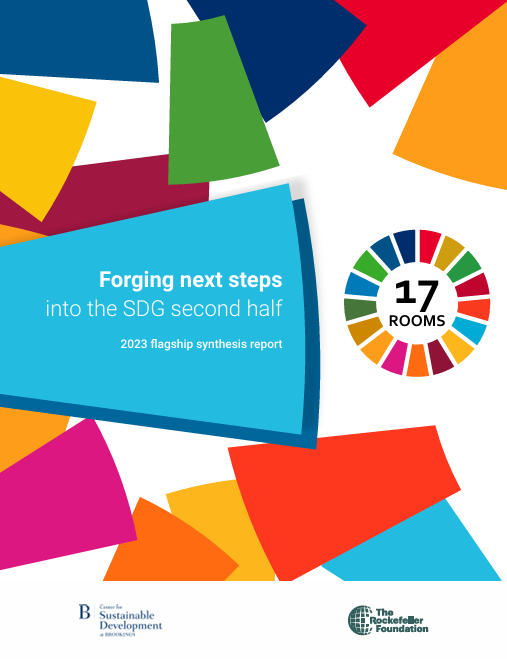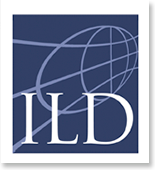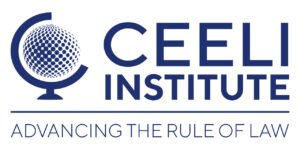Furthers the 17 Rooms initiative’s mission of fostering action, insight, and community for sustainable development. Importantly, this report offers valuable insights and suggestions on progressing the Sustainable Development Goals (SDGs) past mid-2023. Specifically, it details practical next steps and actionable plans pinpointed by 17 Rooms participants to execute over the upcoming 12 to 18 months. 2023 Global Flagship Synthesis Report
Additionally, the report underscores the inherent value of collaborative actions, exchanging ideas across various SDGs, and formulating plans to propel collective action towards SDGs completion. This document advances practical initiatives and nurtures a collective sense of enthusiasm, opportunity, and responsibility in achieving sustainable development goals.
Overall
Major Themes
These major themes serve as a reflection of the diverse range of discussions, initiatives, and insights. Furthermore, they highlight the insights shared by participants in the 17 Rooms flagship synthesis report for 2023. Ultimately, these collective efforts significantly address global challenges and drive progress towards the SDGs.
- Advancements in Measurement Technology: Several Rooms utilized tech innovations in impact accounting and measurement, notably in textiles and ocean management. They worked on standardizing impact accounting, recycling, and breakthroughs in ocean technologies.
- Advancing Local Approaches to Global Challenges: Recognizing the significance of aligning global goals with local needs, the conversations focused on how local adoption of SDGs can reveal new opportunities. Community foundations demonstrated how SDGs can fuel grassroots initiatives and impact.
- Reframing Challenges to Inspire Action: Participants focused on reframing challenges to drive progress in sustainable development. Rooms explored new ways to communicate evidence and set incisive policy targets, particularly in addressing inequality and global water challenges.
- Climate Change as a Multi-Dimensional Challenge: Climate change, affecting many life aspects, requires fast tech deployment, fair opportunity distribution, and diverse stakeholder collaboration. Actions intersecting with other SDGs were targeted.
- Actionable Collaborative Leadership: The report highlighted the effectiveness of diverse leaders in creating action plans and the crucial role of collaboration in sustainable development. The 17 Rooms initiative demonstrated the value of discussion and consensus in deciding on actionable steps.
Room Action Agenda Summaries
Showcases the varied, collaborative, and innovative efforts by the 17 Rooms in developing actionable plans and initiatives. These combined efforts aim to advance towards the Sustainable Development Goals (SDGs) and tackle global challenges.
- Collaborative Efforts: The Rooms typically consisted of groups of 10-20 participants who met virtually or in-person to exchange views and coordinate around priority next steps that could be advanced within 12-18 months. The collaborative nature of the Rooms allowed for the development of actionable plans and initiatives.
- Live Feedback from UN Deputy Secretary-General: As part of the process, all Rooms could present their work-in-progress to UN Deputy Secretary-General Amina Mohammed, who provided real-time feedback to each group. This interaction helped refine and enhance the action agendas developed by the Rooms.
- Innovative Approaches: Rooms like Room 12 focused on innovations in impact accounting in the textiles industry, while Room 14 concentrated on harnessing breakthroughs in ocean measurement technologies. Room 15 explored leveraging AI and decentralized computing for sustainability verification in commodity markets.
- Community Engagement: Rooms like Room 11 showcased how adopting the SDGs at the community level can unlock new opportunities for bottom-up initiatives. The emphasis on local approaches to global challenges highlighted the importance of engaging local communities in sustainable development efforts.
- Collective Leadership: Room 17 advocated developing local agency and leadership as a driving force for system change. The concept of collective leadership was promoted to invest in the collaborative capacities of locally rooted leaders and allies to advance sustainable development goals.
17 Rooms Abstracts
Global Fund for Digital Cash Transfers – Room 1
- Aims to eradicate extreme poverty by 2030 through evidence and technology. Highlights the role of direct cash transfers in poverty reduction, backed by experimental trials. Proposes a Global Fund to expand digital cash transfers using new digital tools and AI for transparency and efficiency. Plans to give lump-sum transfers to those in extreme poverty, supplementing existing poverty reduction strategies.
Fortified Whole Grains – Room 2
- Emphasizes the nutritional value of whole grains and their role in improving diets worldwide, particularly in low- and middle-income countries. It plans to expedite the adoption of fortified whole-grain foods like maize and wheat, focusing on strategic partnerships, policy implementation, and research. Hence, the goal for the next 18 months includes expanding fortified grain school feeding programs in Africa, underpinned by successful pilots in Rwanda, Burundi, and Kenya, alongside a funding strategy and consumer research to support a behavioural change campaign.
Adaptative Cities – Room 3
- Addresses the global threat of climate-driven extreme heat on urban populations, advocating for nature-based and built cooling solutions. The focus is on local solutions for urban adaptation, starting with extreme heat’s impact on health and social equity. Cities like Santiago, Chile, are targeted for data-driven smart city planning and cooling solution development. Room 3 aims to create locally aligned solutions by utilizing data analytics and citizen scientists, promoting learning among cities. The goal is to encourage investment in digital, built, and natural adaptation infrastructure, contributing to health, well-being, and sustainability across the SDGs.
Post-Cop 28 Climate Education Roadmap – Room 4
- Responding to over 90 countries’ interest in climate education will focus on creating ambitious, inclusive policies and plans. They will launch an online platform showcasing 100 teacher-led climate solutions at COP28 and establish a Policy-Practice Translational Mechanism with the help of various educators and Ministries of Education. This initiative aims to validate if teacher-informed policies yield better climate education outcomes.
Addressing Climate and Care Simultaneously – Room 5
- Focuses on the nexus of climate change and caregiving, mainly by women and girls. It highlights the increasing demand for care services and infrastructure due to climate stressors like diseases, loss of arable land, and extreme weather causing economic shocks. Despite the interconnection, care and climate issues are often addressed separately locally. Room 5 aims to bridge this divide by creating a “Top 10” action plan for cities to tackle both issues simultaneously and establishing a global network of learning labs to test these solutions in cities like Barcelona, Bogota, and Toronto.
New Cross-SDG Water Narrative – Room 6
- Emphasizes the global importance of water, referencing the UN’s second Water Conference in March 2023, attended by over 10,000 delegates who committed to 800+ water-related actions. After reviewing SDG 6, UN Member States decided to unify their water strategy. It highlights the urgent water crisis and the risk of inaction to all SDGs, calling out the need for better policy awareness and coordination. It aims to create a new narrative integrating water action into all 17 global goals, starting at COP28 and extending into 2024, to prioritize water on the global agenda and enable global water action.
Decarbonizing Power and Energy Systems – Room 7
- Underscores the need for clean, reliable energy in low and middle-income countries to achieve SDG 7 and combat climate change. Despite existing initiatives like just energy transition plans, continuous evaluations are needed to overcome obstacles hindering power decarbonization. Room 7 aims to develop people-centered initiatives and frameworks for sustainable energy solutions.
Global Green Jobs Index – Room 8
- Stresses the need for green jobs to tackle global climate change and economic inequality. This green economy can reinvent sectors and speed up the transition to a sustainable future, providing jobs for the growing youth population, especially in the Global South. Room 8 is creating a Green Jobs Index to help countries track their progress in creating green jobs. In 2023, a detailed business plan was formulated for the index, including measurable indicators. The index is designed to be practical and influence policy decisions, with a focus on independence and transparency. In 2024, Room 8 plans to gather resources, create the first version of the index and conduct pilot tests in a few countries after consulting with stakeholders.
DPGS For Climate Risk Data Analytics – Room 9
- Aims to establish a resilient, inclusive, and sustainable computing infrastructure, known as the “Climateverse”, for climate risk-related early warning systems in Africa. The project will be implemented over three years and includes creating a democratized cloud-based data analytics and modeling environment, developing climate models, establishing data governance, and initially applying these models and systems.
Updating SDG 10 Targets – Room 10
- SDG 10, set in 2015, highlights the need to address inequality. Despite various efforts, progress has been slow. In 2023, Room 10 worked on identifying barriers to achieving Goal 10. In 2024, they aim to set a net-zero target for inequality, using insights from the climate movement. Recognizing businesses’ growing interest in social and environmental causes, Room 10 will also focus on the risks related to inequality and guide private sector engagement.
SDGS For Strategic Innovation For Community Foundations – Room 11
- Emphasizes the use of Sustainable Development Goals (SDGs) for strategic action, especially in community foundations (CFs). By setting time-bound targets and measuring progress, CFs can enhance collective leadership and impact. However, simplifying the SDGs and promoting their strategic value to a broader network of CFs globally is essential. Room 11 aims to create a practice community in 2024 to encourage local SDG application. Experienced CF leaders will refine and share best practices, making them understandable and applicable to CF leaders less familiar with the SDGs.
Circular Economy For The Textile Industry – Room 12
- Tackles excessive garment production, with 30% unsold out of 100 billion garments produced annually. Stakeholders discussed transitioning to circular production and recycling models, emphasizing the importance of a comprehensive assessment of operations’ impact. Frustration was voiced over fragmented efforts in promoting recycling and reuse. In 2024, Room 12 plans two working groups: one focusing on a standard approach to impact accounting and the other on consensus principles to enhance recycling and reuse practices within the industry.
Carbon Removal In Global South Countries – Room 13
- Aims to address the global need to remove 5-16 billion tons of carbon annually by 2050, with an emphasis on the crucial role of the Global South due to its land, renewable energy potential, and workforce. However, current global demand and regulations often exclude fair market access for Global South solutions, coupled with a lack of suitable finance. Room 13 seeks to legitimize carbon markets as a sustainable solution, emphasizing their value for the Global South. Additionally, it seeks to facilitate investment in these solutions by bridging the interests of investors and investees, thus unlocking market access and finance for the Global South.
Unlocking New Ocean Data & Technologies To Address Climate-Ocean Change And Ocean Health And Response – Room 14
- Highlights the importance of ocean health for human prosperity. With the challenges of climate change, biodiversity loss, and human demands, sustainable management is crucial. The overburdening of oceans by human activities calls for urgent action. Despite increasing conservation will, there’s a need for better ocean data. A tech revolution is lowering data collection costs. Room 14 recognizes two main areas for management: 1) The effects of deep seabed mining and 2) Climate risk modelling with ocean data. By 2024, Room 14 plans to focus on these areas, develop case studies, and meet data needs for informed conservation decisions.
Biodiversity Benefits Of Sustainably Produced Food Products – Room 15
- Aims to tackle sustainability challenges in commodity markets by establishing technology and infrastructure to assess commodities based on their ESG impact. This initiative plans to incentivize responsible practices and support sustainable methods, initially focusing on speciality coffee. Room 15 also intends to promote sustainability across various industries by engaging with other significant supply chains.
Institutionalizing Participatory And Deliberative Democracy – Room 16
- Identifies a global crisis of democracy and highlights the rise of participatory and deliberative democracy innovations. To enhance their impact, Room 16 aims to institutionalize these practices for systemic change. Key actions for 2024 include implementing a donor innovation program, developing evidence-based legislation and policies, and establishing an international NGO network for sustained collaboration.
Collective Leadership To Advance Sustainable Development – Room 17
- Advocates for the advancement of human agency and leadership to drive systemic change and promote sustainable development. The group underscores the need for evolving leadership paradigms and strives to enhance investments in collective leadership. By 2024, Room 17 seeks to raise global awareness about the importance of nurturing collective leadership. It is developing a toolkit that includes evidence of the impact of collective leadership on systemic change.
Towards 2024
Outlines the initiative’s future direction and focus areas as it progresses towards 2024. The following is a summary of the key points covered in this section:
- Continued Convening Power: Spotlights the need for diverse leadership groups to agree on actionable, sustainable development steps. The initiative will facilitate stakeholder collaboration on practical ways to achieve the SDGs.
- Varied Approaches to Progress: Underlines the need for varied strategies for different challenges. Some issues need improved execution, while others may require new idea testing or consensus building.
- Emphasis on Big Ideas: In 2024, the focus will be on fostering big ideas to accelerate progress for better outcomes by 2030. The initiative aims to gather stakeholders for collective insights and innovative solutions to complex challenges.
- Cross-Cutting Challenges: Highlights the need to tackle challenges like climate change and disruptive technologies like AI, central themes in the 17 Rooms initiative’s discussions and actions.
- Empowering Collective Action: Underscores collective effort in instigating change and the value of participation in sustainability. The initiative strives to enable leaders to gain insights, establish connections, and contribute to sustainable development.




